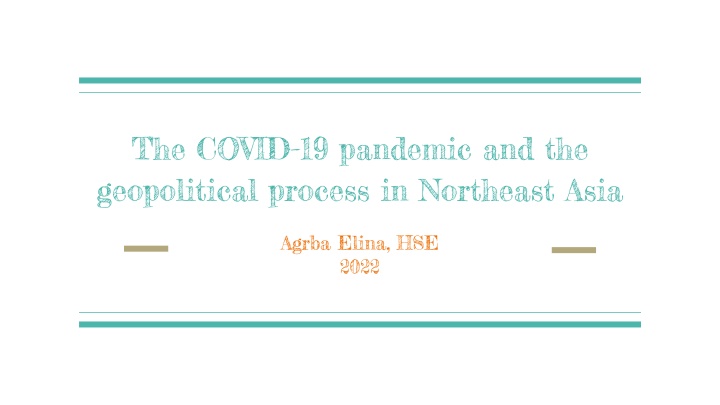
The Geopolitical Impact of COVID-19 in Northeast Asia
Explore the research on political patterns, actions, and changes in Northeast Asia during the COVID-19 pandemic, aiming to identify common interests and overcome economic crises. The study delves into global problems, ways to resolve misunderstandings, and the necessity of regional cooperation. References touch on topics like AUKUS, regional dynamics, and regional cooperation amid COVID-19.
Download Presentation

Please find below an Image/Link to download the presentation.
The content on the website is provided AS IS for your information and personal use only. It may not be sold, licensed, or shared on other websites without obtaining consent from the author. If you encounter any issues during the download, it is possible that the publisher has removed the file from their server.
You are allowed to download the files provided on this website for personal or commercial use, subject to the condition that they are used lawfully. All files are the property of their respective owners.
The content on the website is provided AS IS for your information and personal use only. It may not be sold, licensed, or shared on other websites without obtaining consent from the author.
E N D
Presentation Transcript
The COVID-19 pandemic and the geopolitical process in Northeast Asia Agrba Elina, HSE 2022
In my research In my research the political patterns of these states their actions during the coronavirus period the most significant changes in the global structure identification of possible points of contact of interests that can help the states of the region to create a platform for overcoming the economic crisis
Global problems (there are so many) Global problems (there are so many) coronavirus and coronacrisis external problems (wars, terrorism) internal problems (inequality, poverty, unemployment, hunger) natural problems (warming, pollution, natural disasters) regional problems (ideological confrontation, trade war, asymmetry of development)
How to overcome misunderstandings? How to overcome misunderstandings? share and conduct joint events experiences in the cultural sphere strengthen cooperation in the scientific and educational sphere together to counter global threats (natural, terrorism, drug trafficking) financially support each other due to the coronacrisis organize volunteer programs to help victims to ensure the shared values of the region
Conclusion Conclusion 1. If the countries leave everything as it is, the problems will worsen and all the positive aspects will be in vain 2. States need to cooperate in all possible spheres 3. try to focus on the positive aspects and regionally support each other
References References A. Panda, C. Putz. (2021, December 18). 2021 in Asian Geopolitics: A Retrospective. The Diplomat. https://thediplomat.com/2021/12/2021-in-asian- geopolitics-a-retrospective/ Babones, S. (2022). Understanding the Forever Alliance: What AUKUS Means for Australia and the World. Valdai Discussion Club. https://valdaiclub.com/a/highlights/understanding-the-forever-alliance-what-aukus/ Biscop, S. (2021). AUKUS and the EU: A Snub for the Bloc? Egmont Commentary 22 September 2021. Cheng, M. (2022). AUKUS: The Changing Dynamic and Its Regional Implications. European Journal of Development Studies, 2(1), 1-7. COVID-19 in Northeast Asia: setting the stage for regional cooperation? (2020). University of Cambridge, Centre for Geopolitics. https://www.cfg.polis.cam.ac.uk/commentary/covid-19-northeast-asia-setting-stage-regional-cooperation D. Li, J.-J. Bai. (2020). Asia. Research Gate. Covid-19 promotes the geopolitical transformation of Northeast https://www.researchgate.net/publication/341000858_Covid-19_promotes_the_geopolitical_transformation_of_Northeast_Asia ESCAP, U. (2020). Turning the COVID-19 pandemic crisis into collective SDG actions in North-East Asia. Gauttam, P., Singh, B., & Kaur, J. (2020). COVID-19 and Chinese global health diplomacy: Geopolitical opportunity for China s hegemony? Millennial Asia, 11(3), 318-340.
References References Ivashentsov, G. (2022). - 2019 2024. . Retrieved fromhttps://russiancouncil.ru/2019-northeastasia Kimura, F., Thangavelu, S. M., Narjoko, D., & Findlay, C. (2020). Pandemic (COVID 19) policy, regional cooperation and the emerging global production network. Asian Economic Journal, 34(1), 3-27. Moon, C. I., Jeong, S. Y., & Gardner, S. (2021). Cold War Discourse and Geopolitical Flashpoints in Post-Covid-19 Northeast Asia. Journal for Peace and Nuclear Disarmament, 4(sup1), 284-307. Petri, P. A., & Plummer, M. G. (2020). East Asia Decouples from the United States: Trade War, COVID-19, and East Asia's New Trade Blocs (No. WP20-09). PRESS CONFERENCE - CANBERRA, ACT. (2021). Prime Minister of Australia. https://www.pm.gov.au/media/press-conference-canberra-act-24 Solingen, E. (2021). On Covid-19, Global Supply Chains, and Geopolitics. In E. Solingen (Ed.), Geopolitics, Supply Chains, and International Relations in East Asia (pp. 229-250). Cambridge: Cambridge University Press. doi:10.1017/9781108985468.017 Swanstr m, N. (Ed.). (2005). Conflict prevention and conflict management in Northeast Asia. Silk Road Studies Program. Tsuruoka, M. (2021). AUKUS, Japan and the Indo-Pacific: strategic rationales and challenges. Wilkins, T. (2021). The AUKUS Trilateral Security Partnership and what It Means for Australia. THE SASAKAWA PEACE FOUNDATION. https://www.spf.org/iina/en/articles/thomas_03.html Ye, M. (2021). The COVID-19 Effect: US-China Narratives and Realities. The Washington Quarterly, 44(1), 89-105.
Thank you! Thank you!
